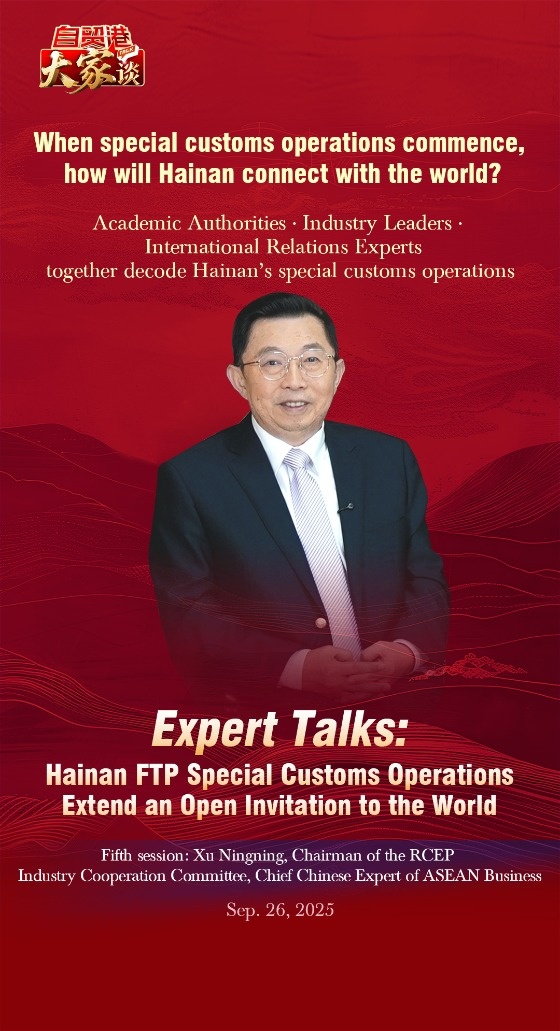
Expert Talks: “Zero Tariffs” Will Drive Commercial Development
By / HIMC / Updated:19:32,26-September-2025
Hainan Free Trade Port island-wide special customs operations are set to officially commence on December 18, 2025. In the fifth installment of Expert Talks on Hainan FTP features, we talk with Xu Ningning, Chairman of the RCEP Industry Cooperation Committee and Chief Chinese Expert of ASEAN Business, to get his take on Hainan's role in regional trade and commerce against the backdrop of special customs operations.

Xu Ningning
RCEP member states show keen interest in Hainan FTP special customs operations
Reporter (R): Hainan Free Trade Port island-wide special customs operations will officially launch on December 18 this year. How do you envisage Hainan better integrating into the development of economic globalization?
Xu Ningning (Xu): Special customs operations go beyond China's continued opening up. They are a widely anticipated major opening up, development, and cooperative initiative that is of common concern to all parties, especially ASEAN member states, Japan, South Korea, Australia, and New Zealand. For some time now, RCEP member states have approached us to ask what key commercial opportunities and new changes for cooperation and development special customs operations will bring with regard to the RCEP agreement. We interact with them in our line of work. Just last week, we held a meeting attended by the commercial attaches of RCEP member state embassies in China, who all expressed a profound interest in this major change about to take place in Hainan as part of China's opening-up efforts. As the launch of special customs operations approaches, more and more countries are becoming increasingly focused on Hainan.
R: Which key areas of Hainan Free Trade Port's development are RCEP member countries most interested in?
Xu: The RCEP is currently the world's largest free trade area, and China has played a key role in this free trade area. With the imminent launch of CAFTA (China-Asean Free Trade Area) 3.0, RCEP members are especially concerned about how to utilize the free trade agreement. Hainan's "zero-tariff" policies will lead to more pragmatic regional cooperation, especially considering Hainan's close, cooperative relations with neighboring countries in the years since reform and opening up began, and the industry cooperation mechanisms it has built in areas like tourism. We believe that these "zero-tariff" policies will result in new and vibrant commercial opportunities and greatly bolster cooperation across the whole area.
Hainan and ASEAN boast strong advantages in industrial cooperation
R: In the six years since 2019, ASEAN has consistently been Hainan's largest trade partner. With Hainan set to enter island-wide special customs operations, how can Hainan develop deeper connections with ASEAN member states, and in which industries can more cooperation develop?
Xu: Hainan has a very close economic relationship with ASEAN. So, there is great potential for cooperation. I've been working on ASEAN-related issues for 34 years. 34 years ago, even 20 or so years ago, it was difficult to imagine that ASEAN would become China's biggest trade partner. Hainan also has tight-knit, deeply rooted friendships with certain ASEAN member states. Many ethnic Chinese people in those countries have roots in Hainan. The Hainan provincial government has also sent delegations to neighboring countries to discuss cooperation and establish partnerships. In the run-up to special customs operations, Hainan's provincial authorities have been doing a lot of work. Once special customs operations are launched, the key is taking the initiative and utilizing Hainan's special policies. Hainan’s enterprises also need to be very aware and fully capitalize on the commercial opportunities. Other cities and provinces in China can also benefit from the Hainan Free Trade Port's special policies. It's an extremely rare opportunity.
Attracting more international industry and business associations to Hainan
R: How can Hainan leverage its strengths as a hub on the intersection of domestic-international dual circulation to better aid Chinese companies in going global and foreign firms in entering the Chinese market?
Xu: One of Hainan's core advantages is its location, its hub advantage. It also has various beneficial conditions for leveraging this advantage, such as the imminent greater opening up (brought about by special customs operations). The RCEP Industry Cooperation Committee is composed of over 50 national-level industry and business associations. We frequently hold meetings with representatives of RCEP member states. They are very keen to leverage the mechanisms and supporting role of these industry and business associations. We also help combine the advantages of government agencies and the business community. Our committee is willing to actively assist relevant parties in Hainan in reaching out to key domestic industry and business associations to advance industrial development and promote enterprise cooperation more effectively.
R: What suggestions do you have for inviting companies that want to invest and start businesses in Hainan?
Xu: As far as inviting them, I think it shouldn't just be about investment. There are many different kinds of invitations we could send. The RCEP Industry Cooperation Committee has established a whole range of industrial cooperation mechanisms. We are happy to actively assist in promoting these mechanisms to give enterprises more choices and room in how they develop. And we can go further than regular enterprise investment. We can get more international industry and business associations to establish offices in Hainan. At present, Hainan must promote itself in neighboring countries and expand its global influence.
Investing in Hainan is an opportunity and the direction of future development, so we need to get the basics of initial opening-up right. The time has come. Investing in Hainan is investing in a future that is already here.
Discover

Expert Talks: “Zero Tariffs” Will Drive Commercial Development
19:32,26-September-2025
New NEV models & cutting edge technologies to debut in Hainan!
19:31,26-September-2025
Creativity and Opportunity: Hainan Emerges as Global Design Hub
19:27,26-September-2025
International Students Share Wanning with the World
19:27,26-September-2025
What do Hainan’s special customs operations mean for you and me?
17:14,17-September-2025
Young Hainan FTP International Content Creators Visit Qionghai
17:14,17-September-2025










 thisishainan@163.com
thisishainan@163.com